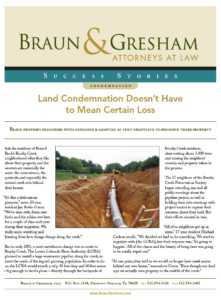Braun provides neighbors with guidance & gravitas as they negotiate to preserve their property
Ask the residents of Round Rock’s Brushy Creek neighborhood what they like about their property, and the answers are essentially the same: the convenience, the quietude, and especially the natural creek area behind
their homes.
“It’s like a little nature preserve,” notes 20-year resident Jan Robin Green. “We’ve seen owls, foxes, rare birds, and the robins rest here for a couple of days each year during their migration. We really enjoy watching and learning from how things change along the creek.”
But in early 2001, a most unwelcome change was en route to Brushy Creek. The Lower Colorado River Authority (LCRA) planned to install a huge wastewater pipeline along the creek, to meet the needs of the region’s growing population. In order to do so, the LCRA would trench a strip 30 feet deep and 60 feet across – big enough to land a plane – directly through the backyards of Brushy Creek residents, clear-cutting about 1,800 trees and ruining the neighbors’ serenity and property values in the process.
The 17 neighbors of the Brushy Creek Preservation Society began attending any and all public meetings about the pipeline project, as well as holding their own meetings with project leaders to express their concerns about their land. But their efforts seemed in vain.
“All of us neighbors got up in arms,” 17-year resident Michael Carlson recalls. “We decided we had to do something. We tried to negotiate with [the LCRA], but their response was, ‘It’s going to happen.’ All of the charm and the beauty of living here was going to be totally wiped out.”
“At one point, they told us we would no longer have creek access behind our own home,” remembers Green. “Even though our deed says we actually own property to the middle of the creek.”
“ [David] helped us determine what we wanted, and just gave us his wisdom and guidance. So it cost us much less than hiring a lawyer who just wanted to go directly to court.”- Michael Carlson, landowner
Feeling powerless, the group engaged land-conservation advisor David Braun of Braun & Gresham for help. The neighbors were pleasantly surprised by Braun’s “backseat” approach.
“Rather than just steamrolling through – ‘we’re going to sue this, we’re going to sue that’ – David let us develop our own plan,” explains Carlson. “He helped us determine what we wanted, and just gave us his wisdom and guidance. So it cost us much less than hiring a lawyer who just wanted to go directly to court.”
“At Braun & Gresham, we try to adopt a holistic approach to land-condemnation cases,” Braun says. “Most attorneys go into these situations focused solely on the money – total loss is assumed; the only issue is how much we get for the use of the property. Of course, we want clients to receive fair compensation, but we also want to protect their land as much as possible, minimizing impact. We take a step back and take a bigger view of the situation – what options may be a vailable for us to negotiate with? The deal isn’t done until the bulldozers have finished.”
While Braun let the neighborhood group lead their own charge, his influence alone shifted the atmosphere at meetings with sewer-project leaders.
“Before David was with us, they were like, ‘We’re in charge and we’re going to tell this neighborhood what we’re going to do,’” says Carlson. “Once David was there, he knew all of the players on the other side of the table and they knew him, and it was more like, ‘What can we do to help you out? How can we go about making this better?’ David’s presence changed the whole tone of the conversation.”
“The LCRA just wanted to do what they wanted to do, and would do whatever it took to get it done,” Green adds. “David was able to negotiate through that, and that was enormously helpful.”
With Braun’s help, the Brushy Creek Preservation Society was able to negotiate for not only better right-of-way payment, but also got their septic-tank systems connected to the city’s main sewer system and their wells to the city’s water, as well as a replacement of their country-lane-like street with a newly paved road. Additionally, Braun’s attention to preserving the land and environment secured specific post-construction provisions to restore top soil and native grasses, replant trees and shrubs, and ensure proper stormwater runoff.
With the time Braun bought them and a little found luck, the group eventually got the LCRA to tunnel under their yards rather than trench through them. The pipeline already required tunneling beneath other property – office buildings, parking lots, etc. – and when it was discovered the tunneling machine was going to sit idle for months before its next Central Texas project, the tunneler reduced his rate, and the project leaders agreed to let him tunnel under the Brushy Creek neighborhood.
Even though the tunneling option wasn’t a direct product of Braun’s involvement, it probably wouldn’t have happened without the change of tone and approach. The neighbors of Brushy Creek remain ever-grateful for his influence – especially since other nearby neighbors who didn’t have Braun’s representation are paying the price.
“In the summer of 2010, the creek flooded” relates Carlson. “All kinds of debris came rushing full-throttle off the trenched land and hit my yard. Dozens of my trees were uprooted, and the weight of the debris bent others in half. Those people upstream clearly didn’t negotiate for any restoration of their land, or erosion or flood control at all.”
“Other people who didn’t have [David Braun] to represent them were like fish out of water,” Green concludes. “With him, we had a voice, and a voice the LCRA would listen to. Most people lose, and we didn’t.”



